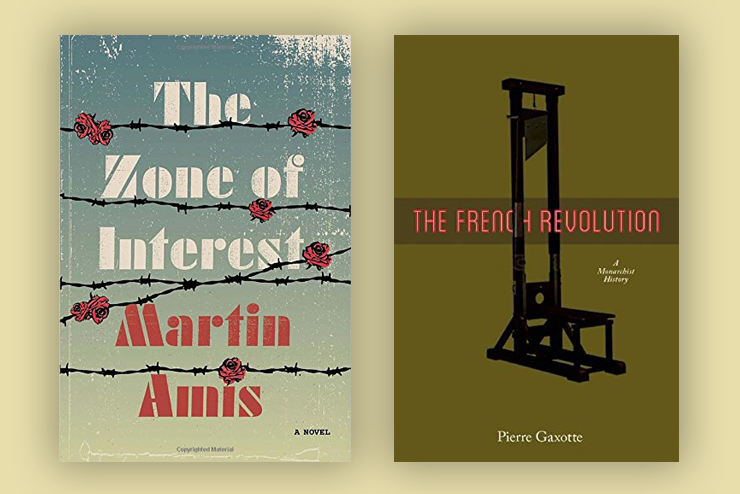The novelist Martin Amis is the son of Kingsley Amis, whose Lucky Jim (1954) was a spectacular success. Noting the father’s “brilliance and ‘facile bravura,’” Atlantic critic Geoffrey Wheatcroft asserted that Martin “misunderstood his hereditary gifts when he turned from playful comedy to ‘the great issues of our time.’” Among his “great issues” is that of Nazi concentration camps, given masterful treatment in The Zone of Interest (2014).
The German philosopher Theodor Adorno is purported to have said that after Auschwitz, poetry became “impossible.” Literary critics, George Steiner among them, tend to condemn as barbaric, even immoral, all writing about the “Final Solution” and its implementation; the Holocaust can be represented only by linguistic silence. In 1945, Elie Wiesel, a Jew interned in both Auschwitz and Buchenwald (and later a Nobel Peace Prize laureate), vowed not to write about the subject for 10 years, saying, “I was afraid that words might betray it.” He finally published La Nuit (Night) in 1958.
Thousands of other witnesses have spoken; historians have written reams. Yet for an outsider to reproduce the “concentrationary universe” and its mechanisms still offends many. Claude Lanzmann (maker of the Holocaust documentary Shoah) called attempts at explanation “obscene”; Primo Levi’s brutal camp guard said: “Hier ist kein warum” (“Here there is no why”).
Amis’s literary and moral imagination met the challenge of this extraordinary topic. The Zone of Interest is among the finest novels of Nazi horrors I have encountered—and I’ve read many in connection with my research on French war literature. The novel is exceptional for its use of narrative viewpoints, those of the Nazis themselves and of the victims forced to serve them. One must understand Nazi psychology to write persuasively from their position, and that is no mean feat. Amis conveys the norm of Nazi thinking and actions, truly capturing what Hannah Arendt described as the “banality of evil.” Daily routines, common concerns (wives, children, food, drink—usually of good quality—sexual desire, ambition) survive even as mid-level Nazis carry out methodical exterminations amid crematorium odors and the sounds of screams rising from the cellars.
Amis’s novel exists not to entertain us, but to help us grasp how events unfolded and partly, perhaps, why.
—Catharine Savage Brosman
The values of the French Revolution are those of every radical revolutionary movement that succeeded it, including the one currently dismantling the basic institutions of American society and culture. But there are few historians of the Revolution who can be trusted to avoid propagandizing for it as they write about it. Pierre Gaxotte’s splendidly literate account, long out of print and almost impossible to find in English, expertly covers the stock ground of history—the events from the siege of the Bastille to Bonaparte’s seizure of power—in a political-philosophical framework that puts those events in the proper moral light.
The authority of the Ancien Régime was the result of long centuries of painstaking institution-building. But the ideology of the philosophes and their later, still more radical descendants rejected it based on the flimsiest of rationalist prejudices and misconceptions about human nature.
Even those familiar with the basic facts can learn from Gaxotte’s discussion of the causes of the Revolution. A great lie undergirded by generations of progressivist historians would have it that France was economically and politically crumbling in 1789, and that the Ancien Régime was utterly incapable of commanding the respect of its subjects. But the clearest evidence of popular support for the monarchy and the Church is in the widespread armed resistance that rose up against the Revolution.
The peasants rose up because God and King reached deeply into their lives symbolically and spiritually, providing a kind of sustenance that human beings crave as much as food, and that only those in the grips of a narrow, fanatical utopianism could fail to comprehend. The truth is that France under Louis XVI was a rich country. That wealth extended, albeit unequally, even to most of those at the bottom of the social hierarchy. Such is the precariousness of all human order, even while relatively stable and prosperous; administrative missteps, coupled with the frivolous flirtation of elites with exciting, foolhardy political ideas, can bring it down.
Gaxotte strikes hard at the corrosive effect that American ideas and the American statesmen who embodied and preached them had on pre-revolutionary French society. Our own mythological attachment to some of these founding ideas and individuals notwithstanding, it cannot be denied that the individualist, Protestant fervor of what historian Gregg Frazer aptly named “theistic rationalism” has worked as a solvent to dissolve much of the social glue holding Western civilization together over the centuries. American conservatives who want to get down to brass tacks will have to reckon with what Gaxotte reveals.
—Alexander Riley

Leave a Reply